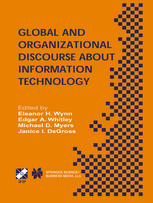

Most ebook files are in PDF format, so you can easily read them using various software such as Foxit Reader or directly on the Google Chrome browser.
Some ebook files are released by publishers in other formats such as .awz, .mobi, .epub, .fb2, etc. You may need to install specific software to read these formats on mobile/PC, such as Calibre.
Please read the tutorial at this link: https://ebookbell.com/faq
We offer FREE conversion to the popular formats you request; however, this may take some time. Therefore, right after payment, please email us, and we will try to provide the service as quickly as possible.
For some exceptional file formats or broken links (if any), please refrain from opening any disputes. Instead, email us first, and we will try to assist within a maximum of 6 hours.
EbookBell Team

4.1
40 reviewsOver the past 20 years, the field of information systems has grown dramatically in theoretical diversity and global reach. This growth is reflected in the language that policy makers and organizational stakeholders use when they talk about their IT plans. As information technology penetrates further into organizational and global life, it becomes ever more important to articulate assumptions embedded in the discourse. This will help to clarify the complex and yet conceptually improvised or pasted-up worldview that becomes embodied in systems. The assumptions point to particular domains of discourse. The discourse sets up conventions and boundaries. It thus shapes what can or cannot legitimately be talked about, researched, addressed, or solved within the scope of IT.
A number of practical and theoretical topics are discussed in detail, including:
*Globalization, development, and space;
*Mobilization of power;
*ERP systems;
*IS planning and projects;
*Critical research and the study of discourse;
*Public institutions;
*Analytical frameworks.
This book contains the selected proceedings of the Working Conference on Global and Organizational Discourse About Information Technology, sponsored by the International Federation for Information Processing (IFIP) and held in Barcelona, Spain in December 2002.